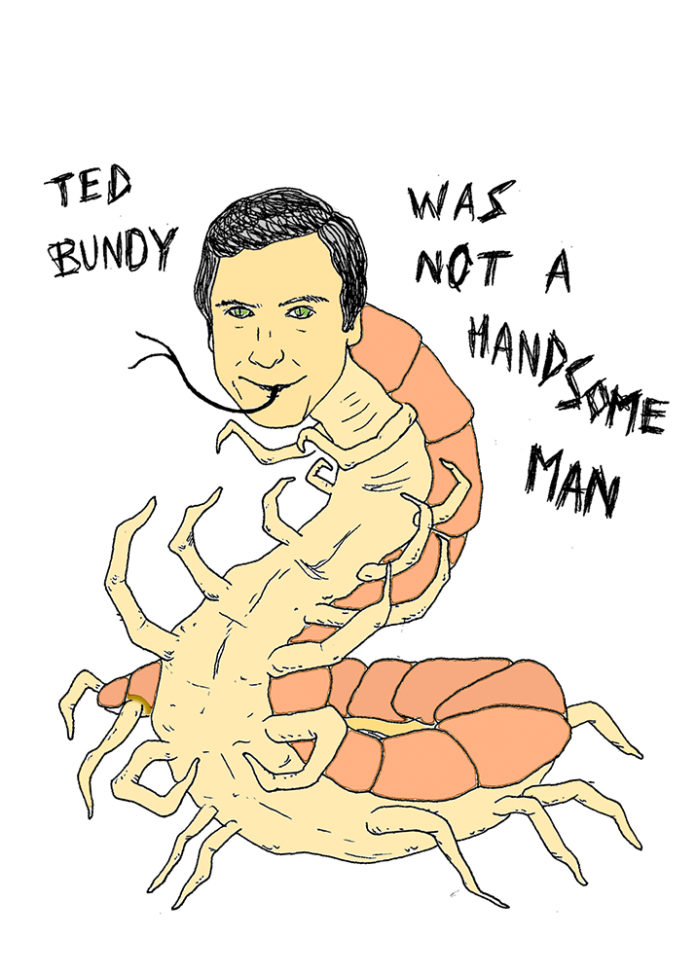I watched the “Extremely Wicked, Shockingly Evil and Vile” trailer play to an upbeat rock song as Zac Efron’s picturesque smile flashed across the screen. The words “America’s most notorious serial killer” popped up where I semi-expected it to say “America’s sexiest criminal.”
I was confused. I thought this trailer would give creepy insight into the twisted relationship between Ted Bundy and his longtime girlfriend, Elizabeth Kloepfer, but instead, it romanticized it. While I recognize that the trailer is only a snippet of the full movie, one thing is clear: the Bundy in the trailer is the same sexy, misunderstood Bundy who drew admirers at his trial and sympathy at his sentencing. The trailer depicts a fictionalized caricature of Bundy, negating his mental health and relationship problems and instead focusing on his most well-known, captivating attributes.
The way the trailer portrays Bundy — as mysterious and a sexy kind of dangerous — is the same way the media has historically portrayed him. It is reminiscent of a 1978 New York Times article written by Jon Nordheimer entitled “All-American Boy on Trial.” In it, Nordheimer wrote that “Bundy claims he is the tragic victim of a tangling web of circumstances,” and described him as “looking rather Kennedy-esque, dressed in a beige turtleneck and dark blue blazer, a smile turning the corners of his lean all-American face.”
Bundy clearly had the public thoroughly fooled with his appealing boy-next-door act. Nordheimer’s description paints a mass murderer as someone who could be mistaken for America’s sweetheart. The “Extremely Wicked” trailer is no better, romanticizing Bundy’s relationship with Kloepfer and focusing on his charm and ability to hold the media’s attention.
Director Joe Berlinger made “Extremely Wicked” to showcase Kloepfer’s views and illustrate the hold Bundy’s manipulative charm had over people. In a response to the backlash against the trailer, Berlinger explained, “We’re portraying the experience of how one becomes a victim to that kind of psychopathic seduction.” Evidently, he wanted this movie to show viewers that Bundy was not a one-dimensional monster but a complex human. But that lesson isn’t new to anyone. One look at the history of Bundy’s crimes is enough to prove he was a charismatic criminal; romanticizing him only does more harm than good.
Instead of showing Kloepfer’s insider experience, it appears Berlinger fell into an old cliché. While Bundy’s girlfriend likely saw more of him than the general public, the trailer doesn’t suggest their relationship was as explosive as she described in her book. The mysterious love story portrayed in the trailer doesn’t hint at an abusive relationship in which Bundy once tried to kill Elizabeth. Instead, it shows a common love story: a bad boy falls for a girl who wants to save him. Even if Kloepfer really did love Bundy, it’s problematic that the trailer romanticizes his violent actions against her. Domestic violence and mental illness both played a role in the story of Ted Bundy’s life and relationship with Kloepfer, yet the vast majority of the trailer only shows them exchanging hugs, kisses and loving glances.
However competent and charming the real Bundy appeared, he was still ill and privately out of control, and his relationship with Kloepfer was toxic behind closed doors. The oversights in the trailer follow a bigger national trend where the subjects of mental illness and abuse are deleted from the storylines. Nearly half of all women and men experience psychological aggression by a partner. 50 percent of individuals with severe psychiatric disorders go untreated. These issues remain pervasive, in part because popular media such as “Extremely Wicked” fails to tell the full story.
One of Bundy’s victims, Kathy Kleiner Rubin, said it is important to show the good qualities he promoted because they were the ones that made him most dangerous. But it’s also important to recognize that Bundy was sick and abusive so that we don’t normalize domestic violence and untreated mental illness. It may be difficult to form a full opinion based on one trailer, but while watching the film, audience members should be mindful that there were more to Ted Bundy than charm and murder. If we as a society are going to continue to obsess over the stories of mass killers, it is imperative to show the complete, hidden narrative.
Corrine Schmaedeke is a sophomore Politics major. She can be reached at cschmaedeke@oxy.edu.
![]()































